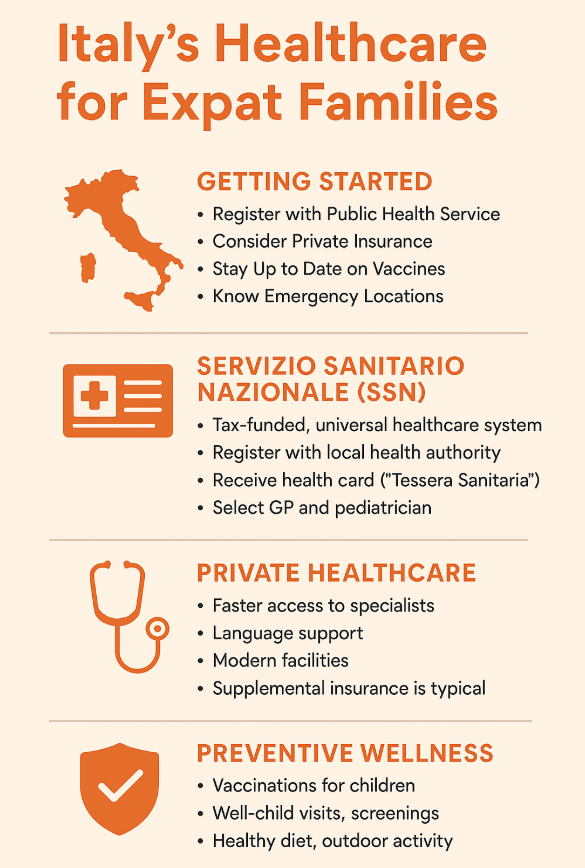Italy consistently ranks among the world’s healthiest countries and enjoys one of the highest life expectancies in Europe. This is due not only to a strong healthcare system, but also to a way of life centered on fresh food, outdoor activity, and close family ties. For expat families, moving here offers the chance to embrace that culture of wellness.
Getting started is fairly straightforward: register with the public health service, consider private insurance, keep vaccinations up to date, and know where to go in an emergency. Once these essentials are in place, navigating Italy’s healthcare system becomes both accessible and dependable.
Understanding Italy’s Healthcare System (SSN)
Italy’s Servizio Sanitario Nazionale (SSN) is a universal, tax-funded healthcare system that provides citizens and legal residents with access to doctors, hospitals, and emergency services. According to the OECD’s Country Health Profile 2023, Italy continues to achieve high standards in health outcomes, with particularly strong results in maternal and child health. This means expat families with children can expect a reliable foundation of care once they are officially part of the system.
Expats who obtain legal residency are entitled to register with their local health authority, known as the Azienda Sanitaria Locale (ASL). To register, you’ll need your residence permit, passport, codice fiscale (Italian tax number), and proof of address. Once registered, you are issued the Tessera Sanitaria—a health card you present at medical appointments or pharmacies. Families will also select a medico di base (general practitioner) for each adult and a pediatra di famiglia for each child up to 14. These doctors provide ongoing care and act as the first point of contact for referrals, prescriptions, and preventive services.
There are some important regional differences. The SSN is managed at the regional level, so resources and waiting times can vary significantly. In general, northern and central regions such as Lombardy, Emilia-Romagna, and Tuscany have more funding and shorter waits, while some southern regions face challenges with staff shortages and longer queues. That said, emergency care and essential treatments are guaranteed throughout the country. As a resident, you can always access the nearest hospital emergency department (Pronto Soccorso) when urgent care is needed.
Private Healthcare and Insurance
Although the SSN offers strong coverage, many expat families also make use of private healthcare. Private hospitals and clinics in Italy are known for their modern facilities, shorter waiting times, and often more personalised service. Many private doctors also speak English or other languages, which can be reassuring for families who may struggle with Italian medical terminology. For routine specialist visits, maternity care, or elective procedures, private providers can offer greater convenience and peace of mind.
The main benefits of private healthcare include:
- Faster access to specialists, tests, and elective procedures.
- Language support, with many doctors and staff fluent in English.
- Comfort and choice, including modern facilities and flexible appointment times.
Private care does come with higher costs. A general consultation typically ranges from €50–€150, and a specialist appointment may cost €80–€200. Diagnostic tests and surgeries can be significantly more expensive. For this reason, most expats choose to secure private health insurance to cover these expenses. International insurers such as Cigna Global operate in Italy, and plans can cover not just local care but also treatment abroad.
Many expat families choose a blended approach: using the SSN for emergencies, paediatric check-ups, and routine vaccinations, while relying on private doctors for faster access to specialists or English-speaking services. This dual strategy allows families to benefit from Italy’s public system while enjoying the flexibility and comfort of private care when needed. Even if you expect to rely mainly on the SSN, having insurance provides valuable reassurance in case you ever need private hospitalisation or faster treatment.
Preventive Wellness for Families
Prevention is a central part of family health in Italy, and vaccination is at the forefront. Italy’s National Vaccination Plan mandates ten vaccines for children up to age 16, including measles, mumps, rubella, polio, tetanus, and chickenpox. These vaccinations are free of charge under the SSN and required for children to attend school or daycare. Your assigned pediatrician will ensure your child’s vaccination record is complete and will schedule any missing doses.
Beyond vaccinations, pediatricians provide regular “well-child” visits to track growth, development, and overall health. For adults, Italy runs national screening programs for conditions such as breast cancer, cervical cancer, and colorectal cancer. Depending on your age and gender, you may receive invitations by mail to attend these free screenings. These services ensure families have access to preventive care that supports long-term health.

Dental care is another key aspect. The SSN covers some dental treatments for children under 14, but most families turn to private dentists for routine check-ups and orthodontic care. A standard cleaning or check-up costs around €50–€100, and braces or complex treatments are considerably more. Finding a local family dentist early on is recommended, especially if your children may need orthodontic evaluations as they grow.
Italy also provides a natural foundation for healthy living. The Mediterranean diet, rich in fresh vegetables, fruits, whole grains, olive oil, and lean proteins, is widely accessible and linked to lower risks of chronic diseases. Physical activity is woven into daily life, from walking to school and work, to the traditional evening stroll known as la passeggiata. Sports clubs and community activities are common for children, giving families many opportunities to stay active together.
Finding Family-Friendly Providers and Pharmacies
Once registered with the SSN, families will choose a GP and pediatrician from lists provided by their local ASL. Recommendations from other expats, neighbours, or embassy websites can be very helpful when selecting a provider. In larger cities, platforms such as Doctors in Italy or MioDottore can connect you with English-speaking practitioners, making it easier to find care in your preferred language. Some services, like MedinAction, even offer house calls or telemedicine with English-speaking doctors.
Pharmacies (farmacie) are a cornerstone of Italian healthcare. Marked by a green cross, they are often the first place Italians go for minor health issues. Pharmacists are well trained and can advise on common illnesses, recommend over-the-counter remedies, or direct you to a doctor when needed. Many medicines are kept behind the counter, so you’ll need to ask for what you need rather than browsing shelves. Subsidised prescription drugs can be collected with your Tessera Sanitaria, while over-the-counter options are paid for out of pocket.
Pharmacies follow regular opening hours but rotate “on duty” (farmacie di turno) services so that one is always available at night or on weekends. If your local pharmacy is closed, a notice on the door will direct you to the nearest open location. Knowing where your closest 24-hour pharmacy is located can save time during a late-night emergency.
Emergencies: What Families Need to Know
In a serious emergency, Italy uses the 112 EU-wide emergency number, which connects you to police, fire, and medical services and often has English-speaking operators. You can also call 118 directly for an ambulance or medical emergency. Both numbers are free to dial. Ambulance services are typically covered by the SSN in true emergencies, so families should never hesitate to call.
At the hospital emergency department (Pronto Soccorso), patients are assessed through a triage system and assigned a colour code: red (critical), yellow (urgent), green (non-urgent), or white (minor). Life-threatening cases are prioritised, while less urgent situations may involve long waits. Care is always provided in emergencies, regardless of whether you are registered with the SSN, and treatment is free for urgent cases.
For urgent but non-life-threatening needs outside regular hours, the Guardia Medica service provides on-call doctors at night, weekends, and holidays. Depending on your area, the doctor may make a home visit or ask you to come to a local clinic. This service is particularly useful for families with young children, offering reassurance when illnesses strike after hours.
It’s wise to keep a list of key emergency contacts handy:
- 112 – EU-wide emergency number (multi-service, English-speaking operators)
- 118 – Direct line for ambulances and medical emergencies
- Guardia Medica – Out-of-hours doctor (check your local ASL for the number)
- Centro Antiveleni (Poison Control, Rome) – 06-490663
Having these numbers on your fridge or in your phone ensures you can act quickly if needed.
From Healthcare to Healthy Living
Italy offers more than just a healthcare system—it offers a way of life that promotes well-being. Families benefit from free pediatric care, robust vaccination programmes, and easy access to pharmacies, while also enjoying a culture where food, activity, and social connection are part of everyday health. By enrolling in the SSN, considering international private medical insurance, and embracing Italy’s preventive and lifestyle practices, expat families can feel secure and supported.

